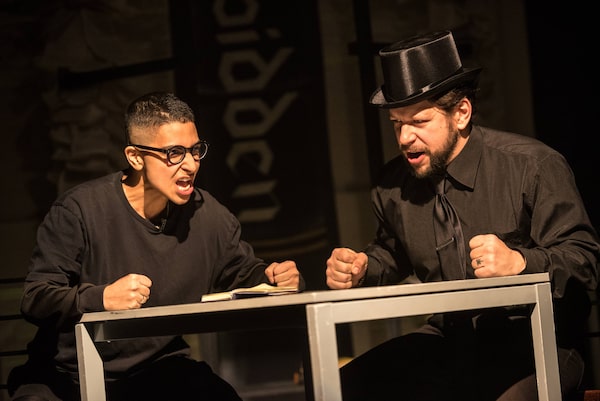
As a stylistic hybrid, Tap:Ex Forbidden is a fascinating showcase of what makes one art form different from anotherDahlia Katz
Tapestry Opera's Tap:Ex series - which puts traditional opera up against unexpected art forms - has all the ingredients that contemporary opera champions agree are essential to opera's evolution. It must tell stories that are current and relevant to its audiences, and it must reach generously outside of its conventional boundaries to welcome in new influences and new artists.
Indeed, the series has produced some arresting productions. 2015's Metallurgy put on the same stage star opera singers Krisztina Szabó and David Pomeroy with Canadian punk band Fucked Up, and the result was nothing short of epic (metal, really). Earlier in the same year was Tables Turned, pairing versatile soprano Carla Huhtanen with composer and turntable artist Nicole Lizée for a night of virtuosity and old-movie-induced nostalgia. In both cases, the product of these unlikely pairings — the spectacle, really — was hugely impressive, and enticing enough to make us think, I don't care what you call it, give me more of that.
Forbidden is the latest instalment of the Tap:Ex series, and it feels distinctly more a vehicle for a message, rather than for its unique combination of Western opera singing, classical Persian music, and rap and hip hop.
The germ of this production was in U.S. President Donald Trump's loathsome "travel ban." Iranian composer Afarin Mansouri, in conversation with Tapestry Artistic Director Michael Mori, discussed the terms "banned" — as in, people from Iran were banned from entering the United States — and "forbidden" — as in, women are forbidden from singing in public in Iran. "Forbidden immediately felt like the right start for a Tap:Ex show," writes Mori, "and quickly the idea for integrating rap/spoken word, a genre with a great empowerment and social justice history, became the natural way forward."
Mansouri says of her starting point that "inside each of us is a small child who finds it irksome to be forbidden anything, who sees things in absolutes, who is outraged by the word 'no', but equally driven to do right, to please and to be liked." It's this dichotomy that starts the story of Forbidden. In her religious schooling, a child realizes she has inadvertently committed a transgression, and she begins her penance of isolation and rote repetition. A stranger appears and muddles her mind with questions, challenging what she understands about laws and social norms. Are the rules of the world in place for the good of mankind, or are they there to punish and abuse?
Mansouri's music sets a libretto by playwright, rapper, and spoken word artist Donna-Michelle St. Bernard. St. Bernard's text is a delicious piece of art, full of plays on words and refrains — "there are things you are not supposed to say/do/know" — that seem to pack layer upon layer of subtextual meaning. The wide-eyed curiosity in soprano Neema Bickersteth (the Child) is foiled by the sideways leers and shifty facial hair of baritone Alexander Hajek (Lucifer). Mezzo-soprano Shirin Eskandani (the Woman) and rap artist Saye Sky (the Boy) transform themselves as the various figures of injustice as Lucifer shows the Child scene after scene of "rules gone wrong." A woman reporting her rape gets arrested for alcohol possession; a priest and a penitent discuss in hushed tones their mutual attraction; a interrogation turns to rape. There are burned books, corrupt figures of authority and child terrorism, all piling upon the Child as she slowly slides from her optimistic worldview.
As a message, Forbidden is undeniably powerful. The world is full of shades of grey, and the difference between right and wrong is found within us, not within one single book or doctrine. And as a stylistic hybrid, Forbidden is a fascinating showcase of what makes one art form different from another. As St. Bernard's words flow through Saye Sky's quick, blunt delivery, and then echo in Alexander Hajek's stretched, evocative expression, it's as though we can watch the text itself undergo a chemical transformation between rap and opera singing.
For this listener's experience, Forbidden is slightly murky. It's hard to explain why, because the elements were in place. Mansouri's music is evocative, ending the show with a powerful climax celebrating personal ego, and a quick, coy bit of denouement that seems to say, "it is enough to be one small person." The cast is strong, as are the musicians: Padideh Ahrarnejad (Tar), Kianoush Khalilian (Ney), and Ali Massoudi (percussion). And the message is right: rules do good, and they do bad. What matters is one's convictions, malleable as they may be.
For nearly 40 years, Tapestry Opera has been producing new work. Whether it's traditional opera or stylistic mash-ups like this Tap:Ex series, successful projects come out of continued attempts to create them. As a piece of theatre, Forbidden, for all the good in it, seemed to add up to something uninspired, less than the sum of its parts. Yet whether or not this reviewer was moved is irrelevant. As with any art, quantity begets quality.